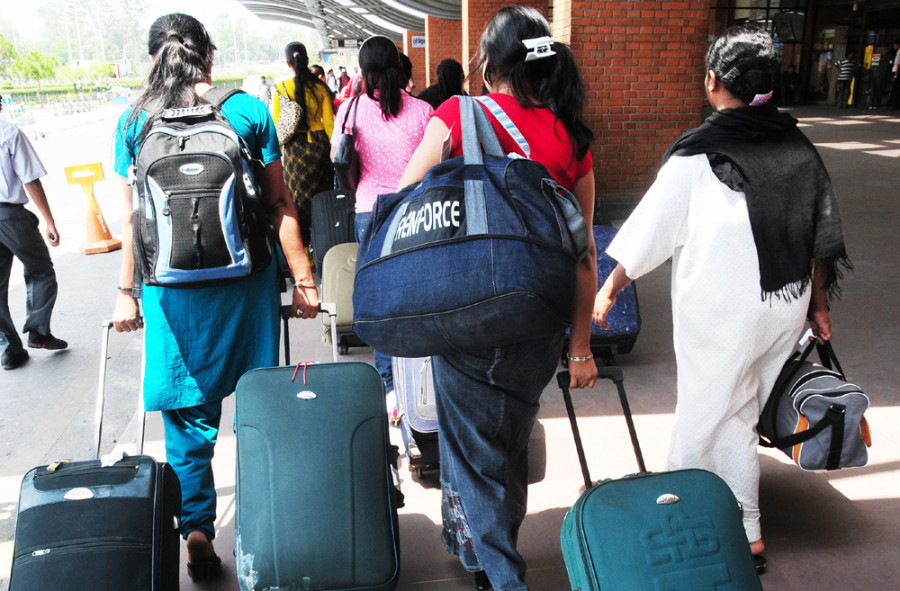National
Returnee women migrant labourers stare at bleak future, survey finds
While some of them want to go abroad for work again due to lack of opportunities in the country, others want government help to stay in the country to start their own business.
Chandan Kumar Mandal
Over two-third of women migrant workers have not even heard of the government’s employment generation schemes and programmes for returnee migrants labourers, a new study says.
Findings of the survey, released on Thursday, show that 76 percent of the women migrant workers, who were either working abroad or had returned home, were not even informed about these schemes.
“Not only were they not aware of the government plans introduced to support returnee migrant workers,” said Pranika Koyu, who conducted the survey, “They also didn’t trust these reintegration and rehabilitation schemes. They doubted these schemes will ever reach them and help them during financial distress.”
The survey, conducted by WOREC and Action-Aid Nepal, was conducted among returnee women migrant workers, those still working in labour destination countries, and family members of workers who did not return home even during the Covid-19 pandemic
“Returnee women migrant workers have suffered a financial hit after having to return due to the pandemic. During the pre-Covid-19 time, they were sending money to their fathers or husbands back home,” said Koyu, whose research identified the choices returnee migrant women workers have as the country battled the pandemic with limited resources.
It looked at government’s policy and decisions around Covid-19 and how it has affected the returnee women migrant workers, including the psychological stresses families of women who could not return face. It also aimed at identifying the impacts on their livelihood and status in society in the wake of the pandemic.
“They didn’t have control over how the money was being spent. Those remittances were also not utilised in the productive sector,”said Koyu. “Women migrants had been taking care of their families and bearing the burden of educational expenses of their kids. Now they are worried about how they are going to pay for the education and health services for their family members.”
The study, based on in-depth interviews with 30 women migrant workers— five of them still abroad and 25 returnees who returned as early as one year before the beginning of the Covid-19 pandemic and as late as June 2020 under the government’s repatriation programme— found out that only 14 percent of the women migrants had heard about government-run employment programmes. But even they didn’t understand the details of such programmes.
Nearly, 10 percent had heard about the Prime Minister Employment Programme—the temporary employment scheme that aims to provide a minimum 100-days of employment to unemployed citizens.
The survey findings showed that the financial situation of the returnee migrant workers in Nepal and women migrant workers abroad was different.
Returnee migrant workers had little or no savings of their own to see them through uncertain times. The returnees needed Rs10,000-15,000 per month to cover their household expenses, including their children’s education. They also required money for continued medical treatment of their sick parents-in-law.
While returnees women workers were desperate to earn to take care of their family expenses, those still abroad did not mind being underpaid during the difficult times of the pandemic.
Until March, 60 percent of women migrant workers had received their salary as per their work contract. Wage theft among migrant workers has been rampant even before the pandemic. But this time around, women migrant workers, who were being paid only half of their wage, were hopeful that their company would pay them later.
“Some of them were happy that the company was still paying them. They were not dissatisfied that they were not paid. They said it was a difficult time for all, so they were not paid,” said Koyu.
A significant number of Nepali workers have been returning home empty-handed after their contracts were either terminated in the wake of Covid-19 or they had to rush to return home.
According to Harishchandra Ghimire, joint-secretary of the Ministry of Foreign Affairs, whenever the issue of wage theft was reported to the Nepali missions abroad, officials tried their best to solve the issue.
“We can’t say that not a single worker faced a problem during such a difficult time, but Nepali missions are trying their best to address the workers’ problems,” said Ghimire. “Sometimes workers had to leave on a short notice. But clearing of dues takes time so they might have returned unpaid. In such cases, arrangements are also made so that these workers get paid later.”
The report also pointed out the ordeal faced by women migrant workers during the pandemic in destination countries and in Nepal upon their return. Quarantine facilities were not women-friendly and they were ill-managed.
“It looked as if the government’s decisions were being imposed on returnee migrant workers,” said Koyu. “For example, returnee women migrant workers wanted to stay in Kathmandu for sometimes, but they were sent to their native places.”
Returnee migrant workers also expressed their intentions to start their own business in Nepal so that they can stay with their families. But they expected financial support as seed money to do so. About 47 percent of respondents said they were interested in agriculture, livestock and business.
Unable to see future opportunities and employment in Nepal, about 43 percent of the respondents wanted to go abroad again. Another 1o percent were still undecided.
“Running the household was the main concern for the workers,” said Koyu. “They are worried about what kind of work they will get with almost no skills and their age. They are not sure about getting jobs for at least two years. Government agencies like the Foreign Employment Board should do something so that returnee women workers can avail government schemes rolled out to help them.”




 14.24°C Kathmandu
14.24°C Kathmandu















